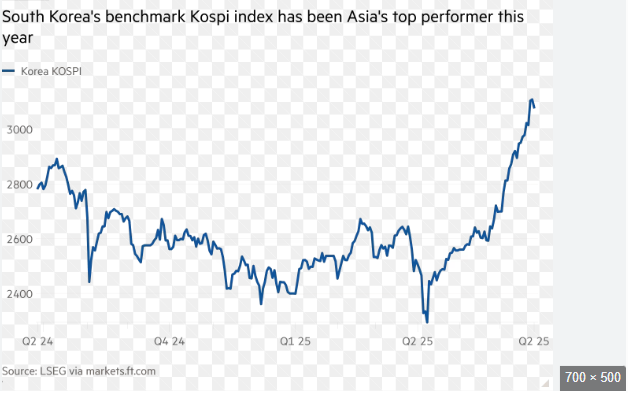Key takeaways
- South Korea’s stock market is booming, driven by rising interest in cryptocurrency projects tied to the Korean won, particularly stablecoins.
- Tech Giants like Kakao Pay, LG CNS, ME2ON, and Aton have seen massive gains, capitalizing on the digital currency trend.
- Retail investors are flooding the market, betting on companies that will benefit from stablecoin issuance, though much of it is driven by speculation.
- While the government has yet to clarify its stance on won-backed stablecoins, legislative proposals and key appointments have sparked optimism and concern.
- Experts warn that current stock prices may not align with companies’ operational realities, urging caution as the market anticipates regulatory clarity.
South Korea’s Stock Market Surges with Crypto Boom
South Korea’s stock market has seen an explosive rise in the first half of 2025, fueled by surging interest in cryptocurrency projects tied to the Korean won.
The primary driver of this market rally is the growing anticipation surrounding stablecoins backed by the national currency, following a pledge from the newly appointed President Lee Jae-myung to support their development. As a result, stocks of companies involved with blockchain and fintech technologies have posted staggering gains.
Tech Giants Dominate the Surge
Korean financial technology firms have emerged as the biggest beneficiaries of the crypto wave. Kakao Pay, for example, saw its stock skyrocket by over 100% during peak trading periods.
Meanwhile, LG CNS, a telecom giant, posted nearly 70% growth, although it recently experienced some corrections.
The gaming industry also has been explosive: mobile developer ME2ON surged by 200% after its subsidiary launched a dollar-pegged stablecoin for gaming platforms.
Additionally, cybersecurity firm Aton gained about 80% as investors positioned themselves for a booming stablecoin infrastructure market.

The Kospi, South Korea’s benchmark stock index, has surged nearly 30% year-to-date, making the country the top-performing market in Asia for 2025.
Retail investors have been quick to invest, pouring funds into companies linked to the anticipated launch of stablecoins. This influx of capital reflects widespread speculation as the market bets on the country’s digital currency future.
Investor Optimism Despite Regulatory Uncertainty
While the market’s meteoric rise continues, the South Korean government has yet to define an official stance on won-backed stablecoins. However, the appointment of Kim Yong-beom, a digital asset advocate, as President Lee’s chief policy advisor has spurred optimism.
The ruling party’s recent proposal to allow companies with as little as 500 million won in equity to issue stablecoins has sparked both excitement and concerns. Critics argue that this could allow undercapitalized firms to enter the space, raising risks to financial stability.
The Bank of Korea has also expressed caution regarding the issuance of stablecoins by non-bank entities. Governor Rhee Chang-yong warned that such moves could disrupt capital flows and affect the country’s monetary policy. Ongoing discussions about regulatory frameworks highlight the tension between fostering innovation and ensuring financial stability in the rapidly evolving digital currency sector.
Analysts Express Caution Amid Euphoria
South Korea remains one of the largest crypto markets globally, with approximately 20% of its population engaged in digital asset trading. In the first quarter of 2025, trading volumes of US dollar-pegged stablecoins reached a staggering 57 trillion won, further intensifying the market’s bullish outlook.
But despite the market’s upward momentum, experts are raising concerns about whether current stock prices truly reflect business fundamentals. Hwang Sei-woon, a senior researcher at the Korea Capital Market Institute, cautioned that investor expectations may be too high. “The introduction of won-pegged stablecoins is likely, but it’s unclear how much they will boost corporate earnings,” Hwang stated.
Moreover, several companies benefiting from the crypto surge still lack the infrastructure needed for large-scale stablecoin operations. This also may lead to a potential market correction as regulatory clarity emerges.
Read More: South Korea Pushes Ahead with Stablecoin Legislation Under New President Lee Jae-myung







